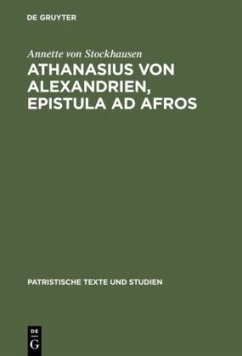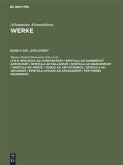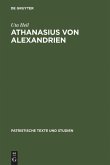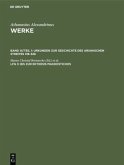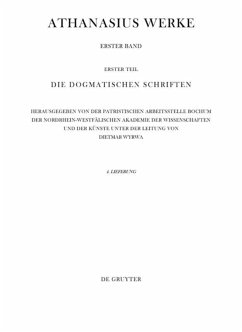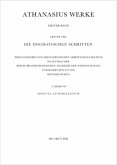The Epistula ad Afros, a letter to the bishops of the diocese of Africa which was probably written approx. 366/367 CE, is an important witness to the theological position of Athanasius in the period after his return from his last exile, a period given little attention up to now. In reference to synodical history as of the middle of the fifties in the fourth century, he expressly puts the Nicene Creed in the foreground of his thoughts as the only orthodox and catholic confession of faith. The present volume offers a translation and individual commentary on the letter from the viewpoints of philology, the history of dogma, and theology. The introduction deals with the following: the transmission of the letter, addressees, date of writing, genuineness, form and genre, relationship to other writings of Athanasius, language, style, forms of argumentation, and structure of the letter.
Die Epistula ad Afros, ein Schreiben an die Bischöfe der Diözese Africa, das wahrscheinlich um 366/67 abgefasst wurde, ist ein wichtiges Zeugnis für die theologische Position des Athanasius in der bisher wenig beachteten Zeit nach der Rückkehr aus seinem letzten Exil. In Auseinandersetzung mit der Synodalgeschichte seit Mitte der 50er Jahre des 4. Jahrhunderts stellt er nachdrücklich das Nizänum als einzig orthodoxes und katholisches Glaubensbekenntnis in den Vordergrund seiner Darlegungen.
Der vorliegende Band bietet eine Übersetzung und Einzelkommentierung des Schreibens unter philologischen, dogmengeschichtlichen und theologischen Gesichtspunkten. In der Einleitung werden behandelt: Überlieferung, Adressaten, Abfassungszeit, Echtheit, Form und Gattung, Verhältnis zu anderen Schriften des Athanasius, Sprache, Stil, Formen der Argumentation und Aufbau der Schrift.
Die Epistula ad Afros, ein Schreiben an die Bischöfe der Diözese Africa, das wahrscheinlich um 366/67 abgefasst wurde, ist ein wichtiges Zeugnis für die theologische Position des Athanasius in der bisher wenig beachteten Zeit nach der Rückkehr aus seinem letzten Exil. In Auseinandersetzung mit der Synodalgeschichte seit Mitte der 50er Jahre des 4. Jahrhunderts stellt er nachdrücklich das Nizänum als einzig orthodoxes und katholisches Glaubensbekenntnis in den Vordergrund seiner Darlegungen.
Der vorliegende Band bietet eine Übersetzung und Einzelkommentierung des Schreibens unter philologischen, dogmengeschichtlichen und theologischen Gesichtspunkten. In der Einleitung werden behandelt: Überlieferung, Adressaten, Abfassungszeit, Echtheit, Form und Gattung, Verhältnis zu anderen Schriften des Athanasius, Sprache, Stil, Formen der Argumentation und Aufbau der Schrift.

